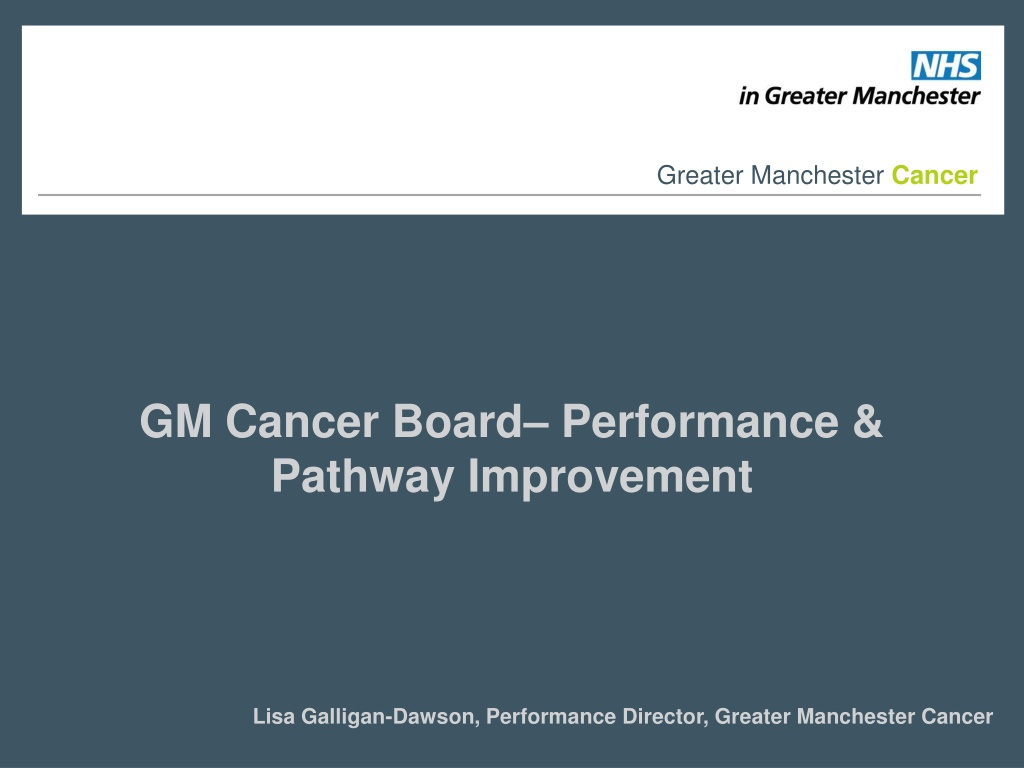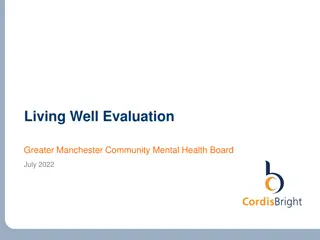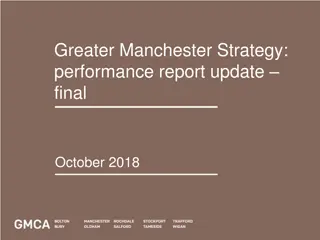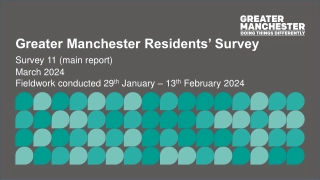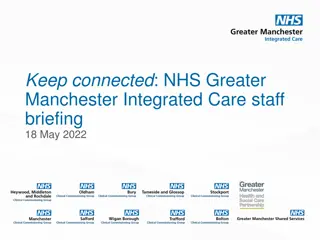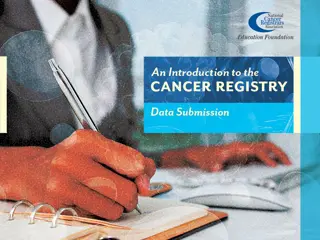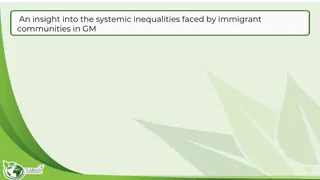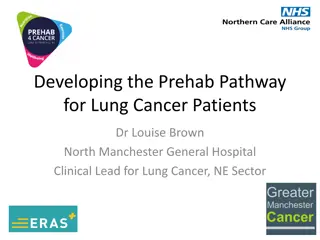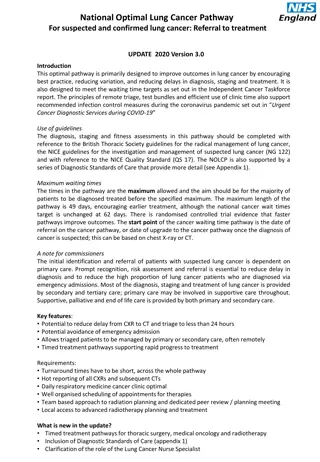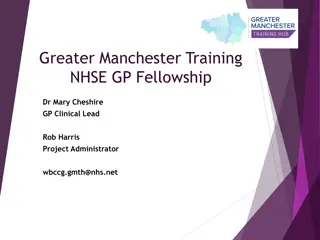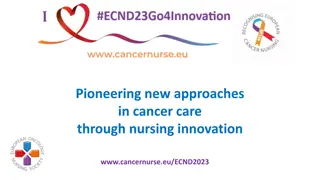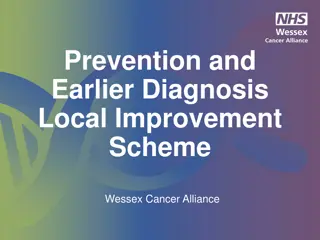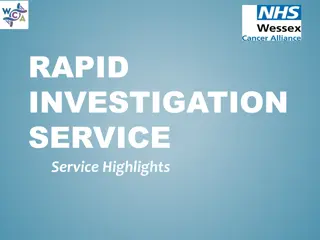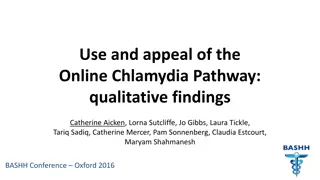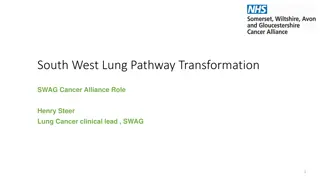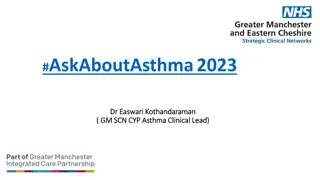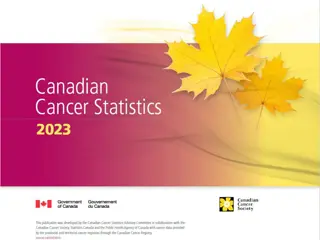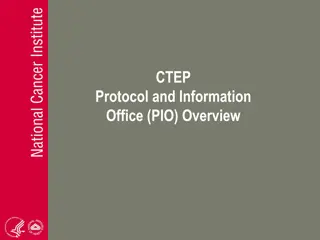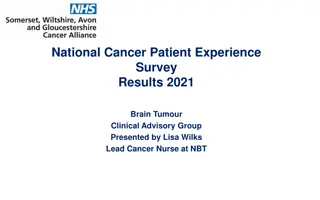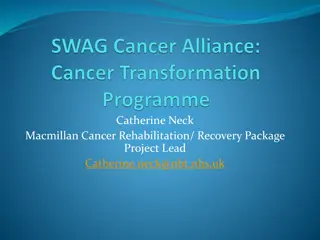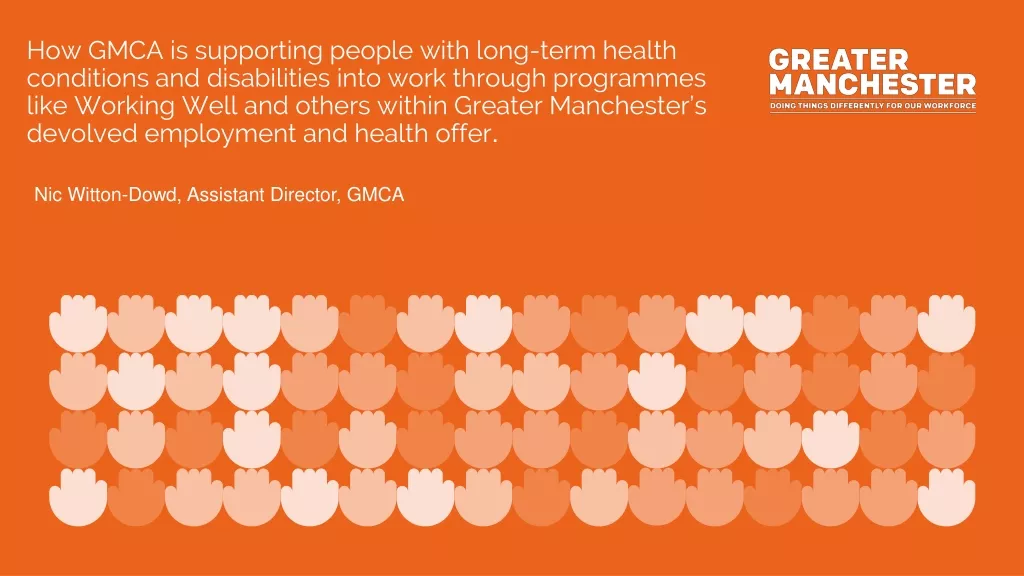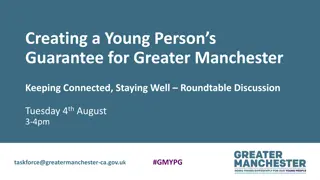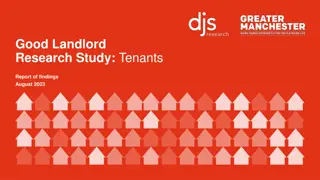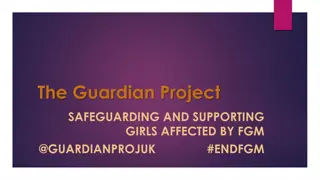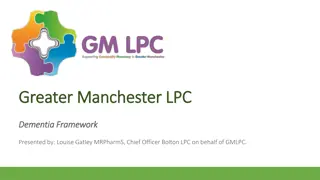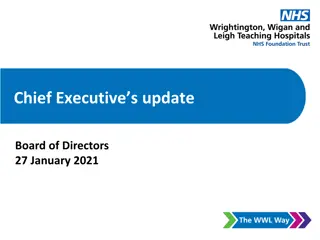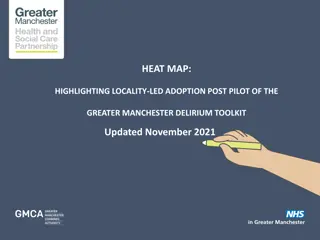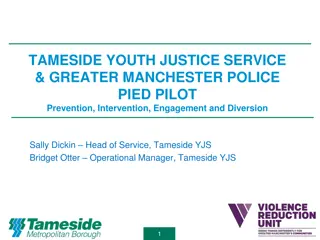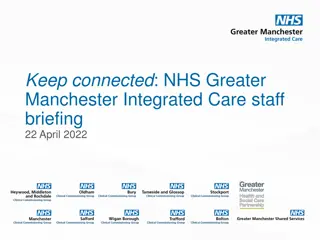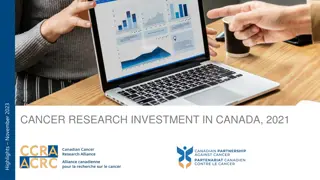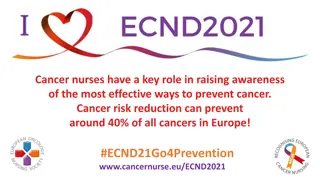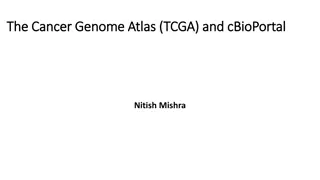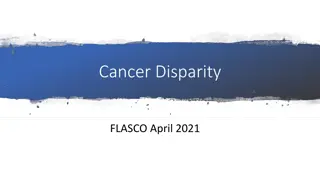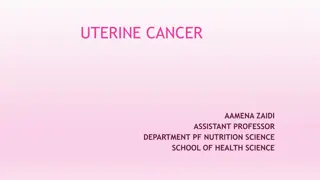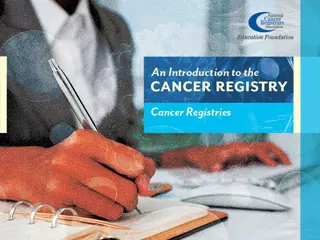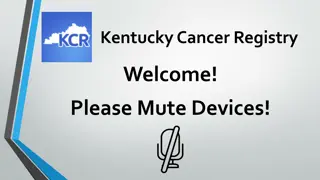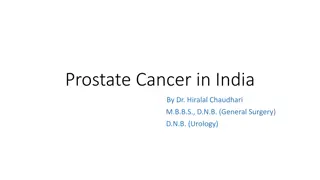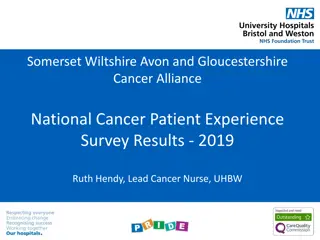Greater Manchester Cancer Board Performance & Pathway Improvement Overview
The Greater Manchester Cancer Board is focusing on improving cancer pathways and performance post-COVID-19. The current position indicates variations in referrals and patient waiting times. With a recovery approach in place, the Board aims to reduce backlogs, enhance visibility of specialty-level pathways, and identify areas of improvement through disaggregated data analysis. The Planning Guidance for 2021/22 emphasizes service recovery and post-COVID-19 objectives, supporting the reduction of waiting times and overall improvement in cancer care services.
Download Presentation

Please find below an Image/Link to download the presentation.
The content on the website is provided AS IS for your information and personal use only. It may not be sold, licensed, or shared on other websites without obtaining consent from the author. Download presentation by click this link. If you encounter any issues during the download, it is possible that the publisher has removed the file from their server.
E N D
Presentation Transcript
Greater Manchester Cancer GM Cancer Board Performance & Pathway Improvement Lisa Galligan-Dawson, Performance Director, Greater Manchester Cancer
Greater Manchester Cancer o Current position o National Performance o Planning Guidance o Recovery Approach & Focus including disaggregation of data
Greater Manchester Cancer Current Position & Context Area Update Suspected cancer referrals (2ww) are now consistently above 100% of pre-covid levels overall (over 116% in some weeks). However, there remains variation between provider and tumour site. (-9% to +38% providers, -11% to +34% CCGs) Referrals The total combined 62 day PTL continues to be elevated, there are 15105 live patients in the system. (This compares to 15411 when reported in November 20, 15608 in September Board , and 13868 at July Board). Patient PTL Numbers The number of patients on combined 62 day PTLs, who are already over 62 days is 1167. Of those, 281 are over 104 days. (This compares to 1564 over 62 when and 377 reported at November Board, 2484 over 62 and 934 over 104 days when reported in the September Board and 2673 over 62 and 1583 over 104 days when reported at the July Board). Backlog The rolling 6 week average of surgical treatment numbers is 279 compared to the 19/20 weekly average of 244. This is around 114% of pre-covid activity. (This compares to 107% when reported at November Board, 87% at September Board and 79% at the July Board). Surgical Treatment At the latest assessment (16.11.20) in GM there are 858 P2 patients on the surgical waiting list. 277 P2 patients awaiting a date for surgery (32%). There are 20 P3 patients awaiting a date. Surgical Waiting List
Greater Manchester Cancer Current Position
Greater Manchester Cancer Current Performance All Providers in GM Q3 20/21 The 62 day measures have deteriorated in February compared to the Q3 performance. This is an expected consequence of reducing the number of long waiting patients.
Greater Manchester Cancer Post-covid recovery Proposed use of milestone waits and KPI s to track improvement, and a focus on pathway milestones rather than aggregate level performance. This approach supports achieving the objectives in the Planning Guidance Truly understand the disaggregated data making up cancer pathways and performance Support backlog reduction Improve visibility of speciality level pathways across the system Support front end pathway improvements To identify levels of variation with a view to planning improvement to support a reduction
Greater Manchester Cancer Planning Guidance There are three over-arching aims for cancer in 2021/22: To ensure cancer services are fully recovered following the COVID-19 pandemic specifically: to address the reduction in the number of people who should have started treatment during the pandemic; To use recovery as a springboard to renew our drive to improve operational performance against the Cancer Waiting Times standards; and To continue to drive delivery of the Long Term Plan ambitions for cancer. Cancer planning to focus on the following delivery principles: Ensuring a data-driven approach to transforming cancer performance and outcomes across local systems; Fostering a system first approach to delivery which builds on the development of cancer surgical hubs during the pandemic; Identifying, monitoring and reducing health inequalities, with a particular focus on tackling any inequalities exacerbated as a result of the pandemic; and, Understanding and improving experience of care, by ensuring patient, carer and public voice is central to co-designed policy development and delivery. Pre-pandemic levels placed GM in the lowest quartile of England for cancer performance. Therefore reduction to pre-pandemic levels should be seen in this context.
Greater Manchester Cancer The delivery challenges Reduce the volume of patients over 62 days from a 2ww referral source from 861 to 761. NB. 2ww referral source accounts for 75% of the current backlog. Proportional backlog reduction will be needed in all referral sources Reduce the volume of patients over 104 days from a 2ww referral source from 220 to 136. NB 2ww referral source accounts for 74% of the current backlog. Proportional backlog reduction will be needed in all referral sources Currently delivering 75% of pre-pandemic first treatment volumes. 100% would equate to an additional 35 treatments per week.
Greater Manchester Cancer Investigating the Aggregated Data Prior to considering an approach to improvement, a project has been undertaken to truly understand the disaggregated data and the issues driving pathway challenges, with the aim to be able to make improvements that will truly improve the pathways, and not just the aggregate position, whilst at the same time improving equity of waiting time access. 1. Data collated from all GM provider Trusts , this was across 4 specialities and included consultant upgrade and classic 62 day pathways. It was based on all patients treated in a GM hospitals with surgery as the first definitive treatment over a 6 month period. 784 pathways:- 200 Lung, 278 Gynaecology, 205 Bladder & 102 Head and Neck pathways. Analysis was undertaken by: Diagnostic provider, Treating organisation, Patient age group, Gender, Ethnicity, Referral source 2. Breach review 3. Thematic analysis of outlying pathways 4. Cancer Performance Review 5. Comparison against deprivation scores Why focus on disaggregated data now? CWT 2ww standard subtle changes means its not always like for like 62 day standard too far away from the standard for this to be an effective measure of improvement currently, standard does not help us address pathway level performance and variation in the region. Standard does not capture all pathway elements (specialist diagnostics etc.)
Greater Manchester Cancer Investigating the Aggregate Data Speciality Example (Lung) There is considerable variation in how pathways are delivered. The most significant relates to the first seen organisations. Example findings for the lung speciality are included below: GM Average Wait (62 RTT) 81.5 days. 33.3 days Variation between provider average (65.7 - 99.0) GM Median wait (62 RTT) 76.0 days. 33.5 days Variation between provider mean (63.5 96.0) Based on 200 Lung surgical pathways, completed over a 6 month period in Greater Manchester
Greater Manchester Cancer Investigating the Aggregated Data
Greater Manchester Cancer An Approach to Improvement To truly drive improvement in Greater Manchester, it is believed that a Pathway and system first approach should be taken. It is evident from the audit that there is variation, and potentially improvement to be gained in all aspects of pathways. Focus should be dedicated to the whole pathway not just the individual sum of the parts. Using milestone waits as a basis for driving improvement is suggested. This approach monitors key aspects of the entire pathway, using average and median waiting times. Clock start to first OPA Clock start to diagnosis Clock start to FDS clock stop Clock start to DTT Diagnosis date to FDT DTT to FDT High level GM position. Followed by pathway breakdown, by referring organisation, by treating organisation. Ability to monitor by treatment modality and sub-speciality. Aim to drive performance in key pathways, not simply focussing on aggregate improvement Clock to IPT IPT to Treat These milestones can be use in each pathway across GM to drive system level focus, through both marginal gains and wider transformation. The same milestones can be used at a granular level with analysis at provider and by sub-speciality to identify key challenges, areas for support and potentially investment as well as developing a focus on reducing variation to improving equity of waiting time access.
Greater Manchester Cancer The value of milestone waits
Greater Manchester Cancer Improvement milestones. Live data, and specialty month end reporting for key specialities
Greater Manchester Cancer Recommendations The Board is asked to support the following 2 recommendations and note the associated caveats 1. Introduce system-level milestone wait reporting to support delivery of the planning guidance, pathway improvement and improve equity of waiting time access Specific focus to improvement across 3 pathways using this approach and a pathway improvement focus as opposed to individual organisational improvement. The specialities proposed are Lung, Lower GI and Upper GI. Rationale - The most significant clinical impact is often associated with lung, and where the 104 day harms have occurred. Lower GI represents the pathway with the highest number of long waiters, Upper GI is a long standing poor performer against the CWT standard. 2. If supported, this approach would require informal diagnostic reporting at speciality level, engagement from providers and cancer commissioners with flexibility to trial changes via an oversight group led by the Cancer Alliance. Caveats Consideration will also need to be given to the resources available to support the micromanagement needed to deliver improvement. It is anticipated that referrals will continue at the current elevated levels, and the PTL is already at 170%. The resources dedicated to management of pathways should be reflective to the changes, which are unlikely to change significantly for at least 12 months. Some recurrent and non-recurrent costs may be required to deliver sustainable change. Full proposal to be worked up through the pilot phase of this approach
Greater Manchester Cancer Why we do what we do It s not the 62 days, it s the 61 nights in between patient to Sir Mike Richards 2018
Greater Manchester Cancer Appendix 1 Key performance tracker and provider breakdown
Greater Manchester Cancer National Performance Details Feb 21
Performance against all key measures as a snap shot, followed by performance by summaries of 2ww, 31 DTT and 62 day by organisation Greater Manchester Cancer Cont .
Greater Manchester Cancer Cont .
